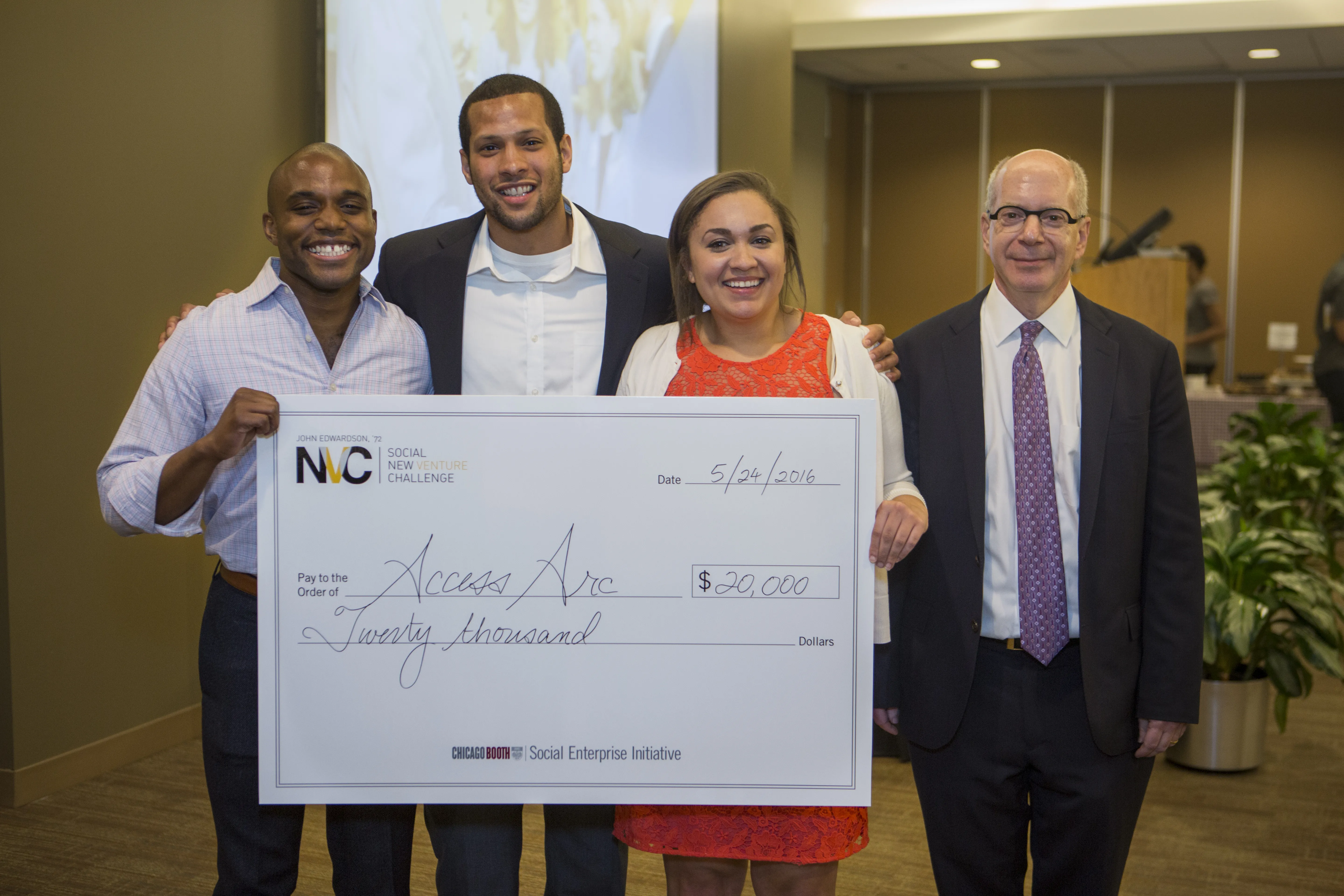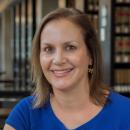Law School Team Wins Booth Competition with Legal Advocacy Venture

The first all-Law School team to enter Booth’s Social New Venture Challenge tied for first place this week with a technology service they developed to give prison inmates increased accessibility to legal advocacy. The members of AccessArc—Vanessa Brown, Darell Hayes, and Michael Savage, all ’16—combined entrepreneurial skills with their knowledge of criminal justice and business leadership to win $20,000 in prize money that will help launch their enterprise.
“When we found out we won the SNVC, it was really one of the greatest and most defining moments of our law school careers,” the AccessArc team wrote shortly after the win. “As the first all-Law School team, we are so grateful for everyone at Booth who believed in our mission and helped us to create a solid business plan and venture.”
Booth’s John Edwardson ’72 Social New Venture Challenge is a competition for UChicago graduate student start-ups that focus on social impact and offer a financially sustainable business model. There were 16 teams in the first round of the competition, and seven finalists presented on May 24. The tied winners—AccessArc and JoinGiving, which links nonprofits with businesses to increase donations—were announced later that evening.
“We are so proud of Darell, Michael, and Vanessa, not just for their well-deserved win at this year’s Social New Venture Challenge, but for the original way in which they’ve used technology to make the judicial process more accessible,” Law School Dean Thomas J. Miles said. “Their accomplishment illustrates that our students aren’t just terrific legal thinkers—they are also leaders and innovators. Our ongoing partnerships with Booth through programs like the Kapnick Leadership Development Initiative and the Doctoroff Business Leadership Program will continue to ensure that our students have the skills to create tremendous change.”
AccessArc—which the team described as “TurboTax for post-conviction petitions”—automates and simplifies a process that is often difficult for prison inmates to navigate on their own. The students received support from mentors at the Law School and across campus. Brown, who is part of the Criminal and Juvenile Justice Project, said that the Law School’s clinical faculty provided a lot of guidance. Clinical Professors Herschella Conyers and Randolph Stone, Directors of the Criminal and Juvenile Justice Project, and Erica Zunkel, Associate Director of the Federal Criminal Justice Clinic, shared their practical knowledge of the criminal justice system and post-trial strategy. Booth professors Rob Gertner, Starr Marcello, and Mark Tebbe were also invaluable mentors.
“They have been very willing and interested in us doing something outside of the general legal education,” Brown said. “A lot of the people they’ve connected us with have been instrumental in getting our idea off the ground.”
AccessArc is also a part of the Business Incubator at the Chicago Innovation Exchange—a space for early stage start-ups that offers mentoring sessions, coaching, and other resources. Through courses at Booth and the mentoring Hayes received from Robin Ross, the Executive Director of the Doctoroff Program, he learned the financial modeling and entrepreneurial skills that prepared him to outline AccessArc’s business plan during the SNVC finals.
“A big challenge for us was communicating the value proposition of our venture in a way that business people would understand,” he said. “Robin helped us refine our pitch so that we could speak thoughtfully to a business-minded audience.”
Ross added, “I am just so proud of these students. They identified a need and then found a way to apply their skills and their passion to solve a critical issue facing the criminal justice system and society. One of the great things about the Doctoroff Program is that it gives students the business tools and knowledge they need to make an idea a reality.”
With AccessArc, inmates answer a series of form questions to see if they are eligible to file a petition with the court. If they are, the computer program will generate a petition that they can print, get notarized, and file right away. If they aren’t, they will get information about other resources and hopefully gain some confidence in the legal system.
It’s a timely project given the recent push to end mass incarceration and efforts to reform sentences for drug-related convictions. By increasing prisoners’ access to the judiciary and streamlining the petition process for judges, AccessArc could vastly lower the amount of money being spent on the prison system across the country, team members said.
“This issue is so big—it affects a lot of people and it has a large dollar amount attached to it, so it’s a huge area that we can change,” Savage said. “And it not only affects the public budget, but also affects real people and their day-to-day lives.”
Another goal, Brown said, was to demonstrate that although the law may be slow to change, law students and future lawyers can and should try to solve the problems facing the legal system today.
“Our goal is also to add value to the law using technology and by bridging the gap between law and business,” she said. “We can use our knowledge and everything we’ve learned here to reach some of the most vulnerable people in the community.”
Now that the competition is over, Brown, Hayes, and Savage are reaching out to institutional partners and other organizations that will support their mission.
“Each of us intends to keep AccessArc as an integral part of our legal careers moving forward,” they said.
